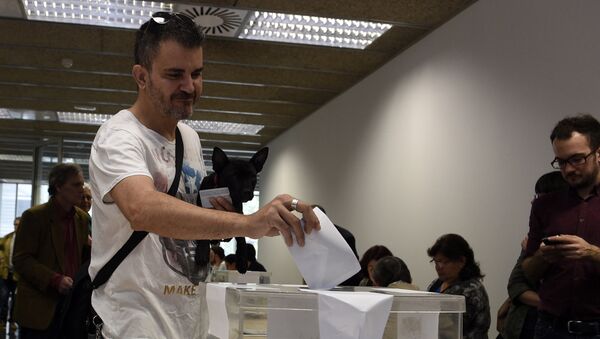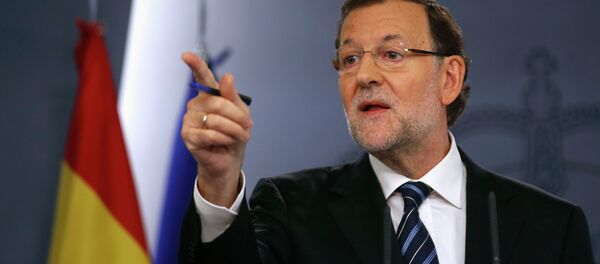MOSCOW (Sputnik), Daria Chernyshova — Sunday's vote challenged a 40-years old two party system in operation in Spain, as the ruling center-right People's Party (PP) suffered a set-back to the anti-austerity Podemos, founded last year, and pro-business Ciudadanos, although securing victory in the elections.
“The main point is now that after 5 years of austerity, politics in France & southern Europe is in flux,” Jonathan Story, emeritus professor of international political economy at INSEAD told Sputnik.
Carlos Puente Martin, an expert in central and oriental European countries, underlined that Podemos and Ciudadanos have shocked the Spanish political establishment and gained strength in the governments of several regions and municipalities following the failures of the PP, headed by Prime Minister Mariano Rajoy, Union, Progress and Democracy (UPYD) and Izquierda Unida.
“PP has become a very unpopular party since its policy on austerity is considered responsible of increasing the social gap, the evictions and social cuts. Asides from that corruption was a major issue during his [Rajoy’s] 4 years’s government,” Puente Martin told Sputnik, adding that former ministers, high ranking officials, including many from the Tax Agency and top banking managers were implicated in fraud cases involving multimillion sums.
Since the death of dictator General Francisco Franco in 1975, Spanish politics has been dominated by two parties – the ruling People's Party and their traditional opponent, the Socialist Workers' Party (PSOE). Yet the rise of new players in the political arena signifies the start of the end of the two party system, as the elections have proved.
Carlos Puente Martin said that the aftermath of the elections is rather sad for the traditional political oligopoly as there is no tradition in Spain of ruling the country as a coalition, as is the case in several European countries.
Rajoy and the two-party system will face another tough test in November, when Spaniards head to the polls to elect the next parliament.
Jonathan Story said that the PP will lose the November vote if it campaigns as “the party of more austerity as the answer to prosperity,” unless Greece leaves the eurozone or the Greek economy tanks even further.
“If Greece falls out, the Euro will be seen by global financial markets as no more than a fixed exchange rate system,” Story told Sputnik. “If Greece tanks further, voters in Spain may think that things in Spain are getting better, and could get a whole lot worse if they elect radical parties.”
EU foreign affairs chief Federica Mogherini on Monday said that the results of the municipal elections in Spain, the presidential election in Poland won by eurosceptic Andrzej Duda, as well as the news from Greece and the UK, show there is a real need to rethink the European project.
Sunday's elections took place in 13 of Spain's 17 regions and in more than 8,000 towns and cities.


